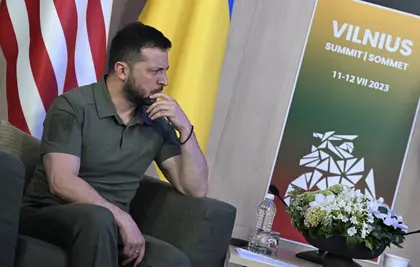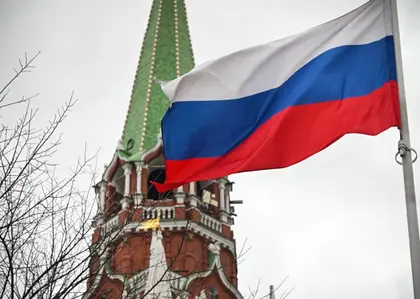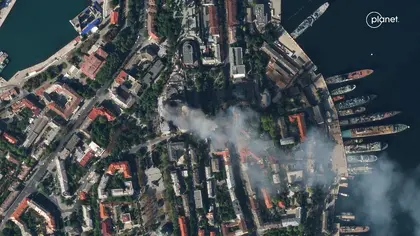Ksenia Yudaeva was deputy to Russian Central Bank Governor Elvira Nabiullina, and in Russian media Yudaeva had been described as Nabiullina’s “close friend” and “right hand.”
On Nov. 1, it was announced that Yudaeva would replace Aleksei Mozhin as the IMF executive director for Russia and Syria, a job that requires physical presence in the IMF Washington headquarters, as some meetings are too secret to be recorded.
JOIN US ON TELEGRAM
Follow our coverage of the war on the @Kyivpost_official.
Yudaeva might eventually make it to the US, as visas can still be provided to individuals under sanctions. But at the time of writing, Kyiv Post’s sources were not aware if Yudaeva had applied for a visa or entered the US.
Why is Yudaeva under sanctions and who is she?
The US Office of Foreign Assets Control (OFAC) added Yudaeva to the list of Specially Designated Nationals (SDN) on April 20, 2022, since she is linked to the public joint stock company Bank Otkritie Financial Corporation.
Otkritie is Russia’s seventh largest financial institution, sanctioned on Feb. 24, 2022, by the same OFAC. Otkritie’s subsidiaries include an insurance company, a bank, and other financial services companies in Russia and Cyprus.
“The United States took significant and unprecedented action to respond to Russia’s further invasion of Ukraine by imposing severe economic costs that will have both immediate and long-term effects on the Russian economy and financial system,” the US Treasury press release stated.

Trump Tells Putin to Make Ukraine Deal ‘Now’ or Face Tariffs, Sanctions
The US imposed full blocking sanctions, freezing Otkritie’s US assets and prohibiting US persons from dealing with people connected with Otkritie. The European Union placed capital market restrictions, disconnected it from the SWIFT bank network, and imposed a full transaction ban, extending its prohibition on deposits to cryptocurrency wallets and the sale of securities in any EU member state’s currency.
Yudaeva was the Chair of Otkritie’s Supervisory Board since 2017, thus linked to the bank under US sanctions.
But OFAC does not mention her role with Russia’s central bank, where she started working as the deputy chair in 2013, alongside the central bank’s current governor Elvira Nabiullina.
Yudaeva’s responsibilities included supervising economic modeling and forecasting, establishing official exchange rates of foreign currencies, and monitoring the functioning of the financial infrastructure, according to Russian news outlet Kommersant.
Although sanctions and hostilities shocked its economy, Russia managed to successfully adapt. It stabilized the economy and even grew 3% in 2023. Only in 2024 did the IMF state that Russia’s economy was overheating and reaching a stagflation point.
“The West made a mistake by making sanctions gradual. Russia’s economy did not collapse with a strategy of a thousand cuts and Ukraine does not have time to wait for the Russian economy to collapse,” Ukrainian economist Yuriy Gorodnichenko said.
The working economy is the key factor that helps Russia continue its war against Ukraine.
Yudaeva is considered to have been instrumental in keeping the Russian economy working.
Will this be enough to consider her a political threat? It’s for the US to decide, and the IMF defers to the US State Department.
Sanctions against Russia
“Sanctions… are most effective at maintaining or restoring international peace and security when applied as part of a comprehensive strategy encompassing peacekeeping, peacebuilding, and peacemaking,” according to the UN Security Council.
Sanctions can vary from comprehensive economic and trade sanctions to more targeted measures such as arms embargoes, travel bans, and financial or commodity restrictions.
A country can impose sanctions unilaterally. For example, the OFAC in the US can enforce sanctions to target regimes, terrorists, international narcotics traffickers, mass destruction weapon traders, and “other threats to the national security, foreign policy or economy of the United States.”
After Russia’s full-scale invasion of Ukraine in February 2022, Yudaeva was added to OFAC’s SDN list.
Who are IMF executive directors?
Executive directors from the IMF Executive Board, “which discusses the national, regional, and global consequences of each member’s economic policies,” according to the IMF website, is one of the IMF’s key institutions.
The Executive Board also approves IMF financing of the member countries and oversees the IMF projects aimed at helping countries gain the knowledge to create professional policies.
In the IMF governance structure, the managing director is the head of the IMF staff and also a chair of the Executive Board, remaining accountable to it. The current managing director is Kristalina Georgieva, a Bulgarian economist.
The Executive Board oversees the day-to-day work of the IMF. However, the final approval of decisions, especially those related to financing, is made by the IMF Board of Governors.
IMF Governance Structure. Source: IMF Website
IMF executive directors are elected by member countries or by groups of countries – the IMF itself does not influence this procedure.
“Executive Directors represent their countries or groups of countries at the IMF’s Executive Board. They are nominated by their member countries and elected to the IMF’s Executive Board by the member country or by a group of countries that they would represent,” the IMF press service explained to Kyiv Post shortly after Yudaeva was announced as Mozhin’s successor.
Some Ukrainian economists expressed dismay at the institution for such a decision.
“With this appointment [of Yudaeva], the IMF is showing that they are willing to ignore violations of human rights and international law. The Fund should have refused this appointment, regardless of whether it was legally possible,” President of the Kyiv School of Economics Tymofiy Mylovanov wrote on Facebook.
But actually, the IMF cannot legally reject such a move. Even if it’s electing a person from the SDN list as the executive director.
From Moscow to Washington and obstacles on the way
On Nov. 22, Bloomberg published a flash message in its Terminal writing: “IMF: Russia Exec. Dir. Yudaeva participating in hybrid meetings.”
Source: Facebook post by Andrii Nesteruk
Andrii Nesteruk, Strategy chief at Finteum, wrote about this in his Facebook post, providing Kyiv Post a broader screenshot with the news page on that day:
Two sources familiar with the matter told Kyiv Post that Yudaeva is not physically in Washington yet.
To get from Moscow to the IMF headquarters in Washington and settle in, she should pass several stages:
- obtain a visa to enter the US
- enter the US physically
- find and rent an accommodation to stay in, as well as pay for it
- obtain a bank account in the US
- pay for day-to-day living expenses: food in supermarkets, taxis, restaurants, and services.
“Granting or not granting a visa is subject to the law on the inviolability of private life. If Ms. Yudaeva considers it necessary to say that she applied, only she will tell you. We do not provide such information,” the press service of the US Embassy in Ukraine told Kyiv Post.
Kyiv Post emailed Yudaeva to get a comment but did not get a reply. The email tracking service, Mailsuite, showed that the email was received, but the addressee did not read it.
The flashes in Bloomberg were not updated since first mentioning Yudaeva either. Kyiv Post has received no information about her intentions to apply.
Yudaeva should apply for the G-4 visa that is required for employees of international organizations to work and reside in Washington, DC.
“An alternative option is the A-2 diplomatic visa, which allows for short-term official visits no longer than 90 days each. But it does not address the issue of permanent residence,” Bohdan Veselovsky, Associate Professor of the Department of Comparative and European Law at the Taras Shevchenko National University of Kyiv, told Kyiv Post.
Adding a person to the SDN list does not automatically mean a travel ban. “Individual visa restrictions are imposed by the Department of State or the Department of Homeland Security,” Yulia Pavytska, Manager of the Sanctions Program at KSE Institute told Kyiv Post.
If Yudaeva applies for any of these visas, the US, just like the IMF, cannot say “no” for a different reason.
The IMF Articles of Agreement, the Fund’s key document, writes that the fund possesses “full juridical personality” and “immunity from every form of judicial process.”
The IMF was first considered an institution free from any form of politics – any political turmoil should not interfere with getting the expert’s work done. The IMF is considered to be a workplace for economists who worked for decades analyzing data, not a place for political debates.
Breaking this rule by not approving a visa might mean the long-time standard is broken, as sanctions usually have an exemption for individuals working in international organizations
“Almost every sanction program has an exemption stating that a travel ban may be lifted or disregarded if a person works for the international organization. Sanctions can also be lifted so that an individual can work in an international organization,” senior lecturer at the Kyiv-Mohyla Academy Bohdan Bernatsky told Kyiv Post.
The US can still reject a visa application without stating the reason, Bernatsky told Kyiv Post. “Many people may not be allowed to enter because the States consider them risky. However, not allowing entry can also undermine their role as the center of international politics.”
Exceptions may be made if their entry is in the interests of the United States or for law enforcement purposes, Pavytska told Kyiv Post.
Washington reached: Now what?
If the US allows Yudaeva to enter the US territory and work physically in Washington but keeps sanctions in place, she will face OFAC restrictions that would make it impossible to pay for the rent and day-to-day activities, because adding Yudaeva to the SDN list includes freezing her assets in the US, prohibition of financial transactions, conducting business, and providing services, directly or indirectly from US individuals and entities, according to Pavytska from KSE Institute.
If Yudaeva has any property in the US, she cannot use it or sell it. No one can make transactions in US dollars with her unless they get a license.
“Most major financial institutions around the world refuse to conduct transactions with or for individuals on the SDN list because of the fear of losing access to US banks. This applies even to transactions that have no connection to US dollars, US persons, or US jurisdictions,” Veselovsky said.
Nor can anyone else cover her expenses – for the same reasons.
This is why the IMF will also be reluctant to help in this situation. But the organization may limit its support to the logistical support of its professional duties, guaranteeing its apolitical nature, the lawyer added.
A test for international sanctions
The appointment of sanctioned Yudaeva as IMF managing director for Russia and Syria poses a significant challenge to the effectiveness of international sanctions.
It might mean that an individual responsible for sustaining the regime threatening global peace has succeeded in working in an international organization – as if nothing had happened.
“Yudaeva’s appointment demonstrates that sanctioned individuals can still achieve significant roles in international organizations, potentially undermining the intended impact of sanctions. Such a development could lead to the sanctions being perceived as less effective because they can be circumvented through strategic appointments,” Veselovsky explained to Kyiv Post.
Sanctions are designed to isolate individuals or entities targeted by limiting their participation in the global world. But Yudaeva’s appointment might ease such a concept.
This is why Veselovsky speculated that Russia might have appointed Yudaeva on purpose. “It also highlights the broader geopolitical strategies Russia is pursuing that could set a precedent for other countries trying to circumvent sanctions. This is not just a legal or diplomatic issue – it could change how sanctions are perceived and applied in the future,” he said.
You can also highlight the text and press Ctrl + Enter













